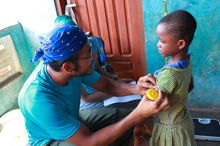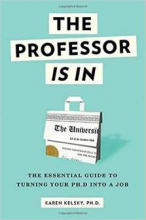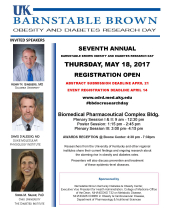Future Physicians Participating in Global Health Challenge Video Competition Ask for Your Vote
Three first-year medical students from the University of Kentucky College of Medicine who have a passion for expanding health care access have produced an original and creative video, “Nosotros Para Vosotros,” meaning “Us for You” that explains the health care needs of underserved populations at home and around the world.
Markey Cancer Center Director Speaks to Alumni
The Greater Louisville University of Kentucky Alumni Club, in corporate partnership with Central Bank and sponsored by UK HealthCare, presents an evening with Dr. Mark Evers, director of the UK Markey Cancer Center, at 6:30 p.m. Tuesday, April 11, at ARGI Financial Group, located at 2110 High Wickham Place in Louisville.
VPR Workshop: Core Facilities Supported by Research
UK Chandler Hospital Named Among the 100 Great Hospitals in America by Becker's Hospital Review
UK HealthCare’s University of Kentucky Albert B. Chandler Hospital has been named among the 100 Great Hospitals in America by Becker's Hospital Review, a monthly publication offering business and legal news and analysis relating to hospitals and health systems.
The hospitals included on this list are renowned for excellence. They are industry leaders in innovation, quality patient care and clinical research, and have received recognition across various publications and accrediting organizations.
Becker's Hospital Review has published a version of this list since 2012.
Graduate Student Successfully Defends Dissertation
On Friday, March 31, 2017 Thitinart Sithisarn, MD successfully defended her dissertation and earned her PhD. Dr. Sithisarn completed her research while simultaneously holding a faculty position in Pediatrics.
Dissertation Committee
Dr. Sandra Legan
Department of Physiology, Mentor
Dr. Ok-Kyong Park-Sarge
Department of Physiology
Dr. Melinda Wilson
Department of Physiology
Dr. Susan Barron
Department of Psychology
Third Annual Appalachian Research Day
UK Center of Excellence in Rural Health is pleased to announce the third-annual Appalachian Research Day, Come Sit on the Porch.
Community-based research begins at the local level, built upon the foundation of relationships with individuals, neighborhoods, and groups who have common questions and concerns. Appalachian Research Day is an opportunity to join in the discussion and learn about findings from research studies that have occurred in local communities.
Come learn about research projects in our community and how you can get involved.
The Graduate School to Host Faculty Workshop on PhD Career Development
Dr. Karen Kelsky will be on the University of Kentucky’s campus Friday, April 7th. In addition to a keynote, Hacking the Academic Job Market, and workshop, Going Post-Ac: The Non-Academic Job Search (more info about these sessions can be found here), she will present a workshop tailored specifically to Directors of Graduate Studies and graduate faculty, Advising for Advisors: How to Help Your Ph.D.s in a Time of Turmoil, from 1:00 to 2:30pm.
Registration Now Open for Barnstable Brown Diabetes and Obesity Research Day
Registration for the Seventh Annual Barnstable Brown Obesity and Diabetes Research Day is now open. The deadline for abstract submission is April 21, 2017. Details of the event, including registration and program schedule, can be found on the Barnstable Brown Obesity and Diabetes Research Day web site.
Thursday, May 18, 2017
Registration now OPEN - https://odrd.med.uky.edu/
University Requires New Process for Projects Involving Animals
[From Kim Carter, Executive Director, Office of Sponsored Projects Administration and Associate Director, University of Kentucky Research Foundation]
Pratical Update in Neurology and Neurosurgery Set for May 5
The Departments of Neurology and Neurosurgery at University of Kentucky College of Medicine and the Kentucky Neuroscience Institute will offer a Practical Update in Neurology and Neurosurgery on May 5, 2017.
"The Practical Update is specifically designed to provide new, useful information that providers can apply to their current patient care," said Dr. Larry Goldstein, chair of the Department of Neurology at the UK College of Medicine.







